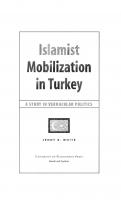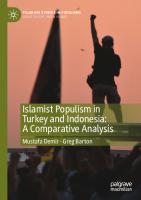Islamist Mobilization in Turkey: A Study in Vernacular Politics 0295982233, 2002022515
The emergence of an Islamist movement and the startling buoyancy of Islamic political parties in Turkey--a model of secu
192 86 15MB
English Pages [309] Year 2002
Preface
Acknowledgments
Introduction
The Political Economy of Culture
Religion and Politics in the Everyday
The Institutional Expression of Islam
Generation X and the Virtue Party
Populism: Democracy is Peace of Mind
Civil Society: In Whose Service?
Islamist Elitism and Women's Choices
Secular Activism in Umraniye
Conclusion
Postscript
Notes
Bibliography
Index
Recommend Papers

- Author / Uploaded
- Jenny B. White
File loading please wait...
Citation preview
II i Mobilization in Turkey A STUDY IN VERNACULAR POLITICS
JENNY
B. WHITE
UNIVERSITY OF WASHINGTON PRESS
Seattle and London
Studies in Modernity and National Identity examine the rela tionships among modernity, the nation-state, and nationalism as these have evolved in the nineteenth and twentieth centuries. Titles in this interdisciplinary and transregional series also illuminate how the nation-state is being undermined by the forces of globalization, international migration, and electronic information flows as well as by resurgent ethnic and religious affiliations. These books highlight historical parallels and continuities while documenting the social, cul tural, and spatial expressions through which modern national identi ties have been constructed, contested, and reinvented.
Modernism and Nation Building: Turkish Architectural Culture in the Ear!J Republic by Sibel Bozdogan Chandigarh's Le Corbusier: The Strugglefar Modernity in Postcolonial India by Vikramaditya Prakash Islamist Mobilization in Turkry: A Stucfy in Vernacular Politics by Jenny B'. White
Publication of Islamist Mobilization in Turkry is supported by a grant from the Institute for Turkish Studies, Washington, D.C. Copyright© 2002 by the University of Washington Press Printed in the United States of America All rights reserved. No part of this publication may be reproduced or transmitted in any form or by any means, electronic or mechanical, including photocopying, recording, or any information storage or retrieval system, without permission in writing from the publisher. Llbrary of Congress Cataloging-in-Publication Data White,JennyB. Islamist mobilization in Turkey : a study in vernacular politics / JennyB. White. p. cm. - (Studies in modernity and national identity) Includes bibliographical references (p. ) and index. ISBN 0-295-98223-3 (alk. paper) 1. Islam and politics-Turkey. 2. Turkey-Politics and government-1980- I. Title. II. Series BPl 73. 7
.W45 2002 324.2561'082-dc21
2002022515
The paper used in this publication is acid-free and recycled from 10 percent post-consumer and at least 50 percent pre-consumer waste. It meets the minimum requirements of American National Standard for Information Sciences-Permanence of Paper for Printed Llbrary Materials, ANSI 239.48-1984. oo S
In Memory of Oma Rosa Schneider
CONTENTS Preface• ix Acknowledgments• xii Introduction• 3 1 The Political Economy of Culture• 29 2 Religion and Politics in the Everyday• 77 3 The Institutional Expression of Islam• 103 4 Generation X and the Virtue Party• 131 5 Populism: Democracy Is Peace of Mind• 156 6 Civil Society: In Whose Service?• 178 7 Islamist Elitism and Women's Choices· 212 8 Secular Activism in Umraniye • 242 Conclusion• 261 Postscript• 273 Notes• 277 Bibliography• 281 Index• 289
PREFACE I became interested in questions of political process when I returned in 1994 to the working-class neighborhood of -Omraniye in Istanbul, Turkey, after having spent considerable time there over the preceding eight years in the course of a different research project. During that time I had noticed that, while -Omraniye's residents seemed quite informed about the platforms of political parties (and on occasion organized themselves to protest an issue or demand assistance from the local government), there was little evidence of what the literature would call civil society: participation in formal civic organizations. This impression was confirmed by surveys that showed little or no participation in civic organizations in Turkey's poorer urban areas, particularly among women. Yet, at the same time, scholars of civil society were pointing to the large and rapidly increasing numbers of civic organizations in Turkey. This lack of fit between civil society and participation caused me to wonder who belonged to these many civic groups, if large parts of the population of Turkey's cities did not. It also placed into puzzling relief the civic activism and political· engagement I had observed in -Omraniye. How did people organize themselves, around what issues, and .why? Spurred by curiosity, I began to investigate civic and political activism over two months in the summer of 1994 and again in 1995, with funding from the Institute of Turkish Studies and the University
x · Preface
of Nebraska at Omaha. Initially, I studied secularist activists involved in setting up voluntary schools that taught skills and literacy to low income women. Soon after the 1994 elections that brought the Islamists to power in Umraniye, I turned my attention to local Islamist activists. In 1997, a Social Science Research Council grant allowed me to spend seven months in Istanbul to take a closer and more sustained look at the activities of both groups. What I learned led me to reconsider the categories of knowledge that I had brought with me into the field and that had guided my orig inal questions, including the much debated concept of civil society. In order to grasp the multiple levels and unexpected convergences of what otherwise would be artificially distinguished as civic, political, and cultural/religious phenomena, a new conceptualization-and a new term-was needed. The term, vernacular politics) makes an argu ment for looking at political process as a hybrid form. This makes possible a new vision of "politics" in societies, like those in the 1\1iddle East, that generally have been examined using a precut yard stick that measures the degree to which democratic institutions have been instituted and civil society developed. The hybrid political movement in Turkey raises theoretical issues of import not only for understanding mass mobilization in Islamic societies, but also in the United States where the new megachurches also cross lines between civic, political, and cultural realms. The book as a whole makes an argument for rethinking the terms we use to understand how people are mobilized to be active participants in public life. In Turkey, I interviewed and observed activists and officials at the local and national levels, including the Islamist mayor of Istanbul, Recep Tayyip Erdogan, and attended rallies and other organized events. The staff at the popular Islamist television station I









